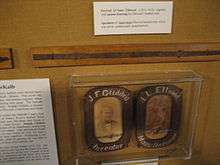Isaac L. Ellwood

Isaac Leonard Ellwood (August 12, 1833 – September 11, 1910) was an American rancher, businessman and barbed wire entrepreneur.
Early life
Ellwood was born in Salt Springville, New York. His first taste of business came as a young boy when he began selling sauerkraut. In 1851, Ellwood, like many others, headed west to the California Gold Rush.
DeKalb, Illinois

Ellwood found some success in California and returned east in 1855, to DeKalb, Illinois, where he opened a hardware and implements store. On January 27, 1859, Ellwood married Harriet Augusta Miller; the couple would ultimately have seven children. As Ellwood rose to prominence he began acquiring farm properties in and around DeKalb, Illinois. After the Civil War ended he began to import Percheron draft horses, many from France. Eventually, this resulted in a 3,400-acre (14 km2) stock farm near DeKalb.
Birth of barbed wire

In late 1872, Waterman, Illinois farmer Henry Rose developed a wire fence with an attached wooden strip containing projecting wire points to dissuade encroaching livestock. He patented his fence in May, 1873 and exhibited it at the DeKalb County Fair that summer. This prompted Ellwood along with other DeKalb area residents Jacob Haish and Joseph Glidden to work on improving the concept. Ellwood patented a type of barbed wire in February 1874, but ever the businessman, concluded that Joseph Glidden's design was superior to his. He purchased one-half interest in Glidden's invention in July, 1874. Glidden's patent issued in November, and together they formed the I.L. Ellwood Manufacturing Company. In the beginning they produced two-strand, twisted barbed wire in the back of Ellwood's hardware store. The business was quickly successful. Ellwood's hiring John Warne Gates as a salesman propelled sales of barbed wire in Texas.[1] Ranchers in the west found their creation useful and much needed. As business and demand took off, the company expanded, reorganized and merged and a successful Ellwood began construction on his Victorian mansion, the Ellwood House.
In 1881, I.L. Ellwood Manufacturing became Superior Barbed Wire Company under an expansion and reorganization plan. Seventeen years later the company would merge in the creation of John Warne Gates' American Steel and Wire monopoly, which was a predecessor of United States Steel.
Support for higher education
DeKalb is home to Northern Illinois University and Ellwood played a major role in making it a reality. It was Clinton Rosette who helped persuade Ellwood that the new Northern Illinois State Normal School should be in DeKalb. So convinced was Ellwood that he used all methods at his disposal to support the cause. His own capital, his time and his political influence were all used to gain DeKalb the new college.
Governor John Altgeld appointed Ellwood to the Board of Trustees, who were responsible for selecting a site for the normal school. This allowed him to assert all the more political influence. In the name of securing the future school for DeKalb Ellwood reportedly donated $20,000 and fronted another $50,000 in a non-interest bearing loan, along with 4.1 acres (17,000 m2) of land for the new school.[2] The bid was ultimately successful and the normal school eventually became NIU.
Texas ranching
In the ensuing time Ellwood's interest in ranching grew. On a trip to Texas in 1889 he purchased the 130,000 acre (530 km²) Renderbrook Ranch in Mitchell County. In 1891 he purchased an additional 128,000 acres (518 km2) northwest of Lubbock, Texas. He acquired more area in 1902 and 1906 bringing his total holdings in Texas to 265,000 acres (1,072 km2). In all, at its height Spade Ranch and Ellwood's other Texas land holdings encompassed 395,000 acres (1,599 km2).
He built a ten-room "cottage" in Port Arthur, Texas which was an authentic copy of a Pompeiian villa from 74 CE.
Ellwood continued to acquire ranch land until almost the time he died, in Dekalb, Illinois in 1910.
Trivia
- The borough of Ellwood City, Pennsylvania is named after Isaac L. Ellwood.
- He is the brother of United States Representative Reuben Ellwood
Notes
- ↑ History of barbed wire
- ↑ NIU Founders: from Northern Illinois University
References
- Ellwood biography: from the University of Texas at Austin
External links
- Biographical timeline
- Ellwood House and Museum
- Ellwood Pompeiian villa: Port Arthur Chamber of Commerce
- Barbed Wire Museum
- U.S. Patent 147,756 – Isaac Ellwood, DeKalb, Illinois Improvement in Barbed Fences – "single piece of metal with four points, attached to a flat rail" (February, 1874)
- Ellwood papers at Southwest Collection/Special Collections Library, Texas Tech University